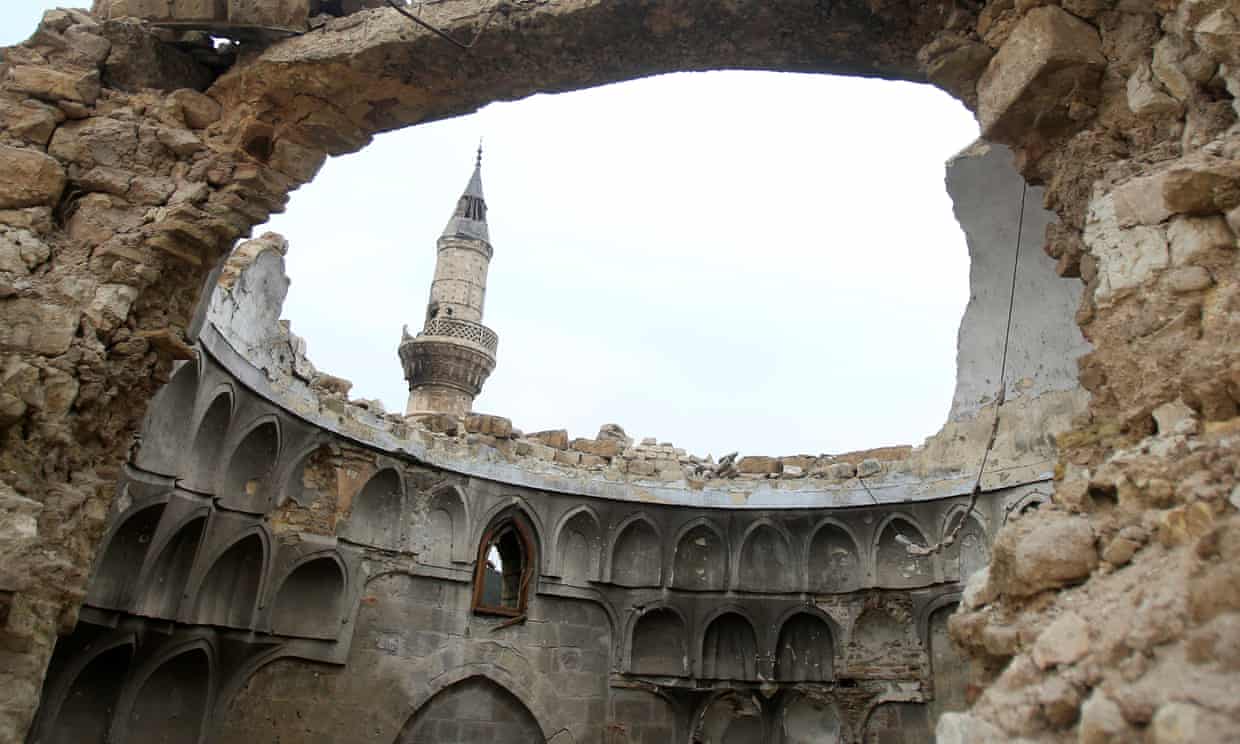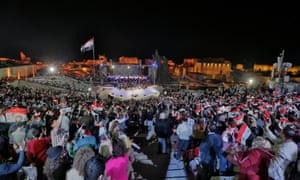The ruins I saw in Syria stand as a rebuke to western inaction
 Diana Darke
Diana Darke
The time for military intervention has passed. But we must still do all we can to make Assad feel the heat
A damaged mosque in Aleppo, Syria, in 2017. Photograph: Ali Hashisho/Reuters
Through a quirk of fate, I was on a bus travelling from Beirut to Damascus on the day that the US, Britain and France launched airstrikes on Syria. The group I joined was on a pastoral visit arranged months earlier, at the invitation of the Syriac Orthodox church, to offer support and solidarity to Syria’s Christians. A circular email had arrived soliciting participants in early March. As my visa application to enter the country, where I have had a home for more than a decade, had been refused in February, it seemed worth trying this route, though my husband and I never imagined we would succeed. We were accepted on the trip – but the experience was surreal on almost every level.
The name of the bus, al-Ma’arri Travel & Tourism, was chosen for an 11th-century blind Syrian poet-philosopher, Abu’l ’Ala al-Ma’arri, whose treatise on forgiveness is thought to have influenced Dante’s Divine Comedy. His poems expressed the pessimism of his times, during which political anarchy and social decay were prevalent. He became a vegetarian and adopted a life of seclusion.
Our clergy-led coach party was treated like royalty throughout; there was no need even to sully our feet with a descent from the bus at the border, which was especially surreal for me, accustomed as I was to queueing for hours. Breezing through the checkpoints, our bus clearly shone with the sanctity of those on board. My previous trip in late 2014, to rescue my Damascus house from war profiteers, had involved packets of cigarettes passed to soldiers and profuse sweating as hands rummaged among my bags.
When I bought the crumbling building in Damascus’s old city in 2005, I did so as a private individual, with no shortcuts or favours. For three years I battled to complete its restoration, fighting labyrinthine bureaucracy, helped only by ordinary Syrians, including an architect and his team of craftsmen, a lawyer and a bank manager. Various friends who lost their homes in the suburbs to bombardment by the regime have lived there since 2012 – up to five families at some points, more after the Ghouta chemical attack in 2013 when the courtyard was full of mattresses. Today, just one extended family lives there at my invitation, in residence since 2015.
Why road to Syria peace could begin in a sleepy Swedish farmhouse
Read more
In the Christian quarter of the city, we were whisked on to a smaller bus that wiggled its way past the Damascus citadel into the pedestrianised square, directly in front of the spiritual heart of the city, the Umayyad mosque. Its magnificent courtyard had been cleared of worshippers in our honour and we were ushered into an audience hall I had never known existed, despite scores of previous visits. Here, the grand mufti – the country’s most senior Muslim authority – Ahmad Badreddin Hassoun, presided over an atmosphere of bonhomie and spoke of the joy of Muslim-Christian relations. Amnesty International notes that the grand mufti’s approval would have been required for between 5,000 and 13,000 executions carried out at Saydnaya prison since 2011.
The compulsory hooded robe for females ensured my anonymity in the official photograph, though I was peeved to discover later that the worry beads given to me were half the size of the men’s – the gender pay gap in another form.
In Homs, our next stop, we passed countless chilling posters of the Syrian president, Bashar al-Assad, mainly in his dark glasses and military fatigues, the slogan beneath assuring his people he would protect Syria from “the terrorists”. Before the war the Assad look was more tracksuited, on a bicycle taking his son to school, or tenderly planting trees at the roadside.

Homs was shockingly empty, acres of devastation, with only the famous Khalid ibn al-Walid mosque hastily restored by the military construction department to be viewed from afar. It is an empty shell for show, like so much else.
We were in Aleppo for Syria’s national day on 17 April and arrived just in time for an elaborate concert put on for the country’s elites inside the citadel. As we walked up the ramp of one of the world’s greatest pieces of military architecture, we looked down over the destroyed souks and mosques, and were issued little Syrian flags to wave and shout “Hurriya” (freedom) followed by “Halab” (Aleppo) when prompted. It seemed like a cruel echo of the earliest peaceful chants for freedom in 2011. Freedom is now on the regime’s terms only.
Back in Damascus, on 19 April I visited my house and watched helplessly from the roof as fighter jets from Mezzeh airbase flew in broad daylight over central Damascus and dropped cluster bombs on the southern suburbs of al-Hajar al-Aswad.
“Trapped” was the word I heard again and again from my Syrian friends, Muslim and Christian, to describe their predicament. While the world debates the legality of airstrikes, to those on the ground the action amounts to no more than hot air. Not one of my friends even mentioned the strikes, knowing their fate remains unchanged – to be killed if they dare to protest or to submit to the will of Assad. It is far too late for the west and the international community to intervene militarily in Syria – that should have been done in 2011, or 2013 at the latest, before Islamic State or Russia came in to fill the lawless vacuum we ignored.
Now the only option is to keep up all forms of pressure on the Assad regime and on Putin, to make both feel the heat. In the past, Assad has caved in quickly to pressure, such as when he removed his troops from Lebanon in a matter of weeks following the international outrage at the assassination of Rafik Hariri, the former prime minister of Lebanon, in 2005. Assad and Putin are umbilically connected at present, but if the cord were cut, leaving Assad stripped of his Russian shield, he would capitulate much faster than anyone imagines. All it needs is a united and coherent policy. That’s something that has been sadly lacking so far.
• Diana Darke is the author of The Merchant of Syria
Since you’re here …
… we have a small favour to ask. More people are reading the Guardian than ever but advertising revenues across the media are falling fast. And unlike many news organisations, we haven’t put up a paywall – we want to keep our journalism as open as we can. So you can see why we need to ask for your help. The Guardian’s independent, investigative journalism takes a lot of time, money and hard work to produce. But we do it because we believe our perspective matters – because it might well be your perspective, too.
I appreciate there not being a paywall: it is more democratic for the media to be available for all and not a commodity to be purchased by a few. I’m happy to make a contribution so others with less means still have access to information. Thomasine, Sweden
If everyone who reads our reporting, who likes it, helps fund it, our future would be much more secure. For as little as £1, you can support the Guardian – and it only takes a minute. Thank you.
https://www.theguardian.com/commentisfree/2018/may/01/syria-rebuke-western-inaction-military-intervention-assad
